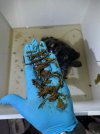I bit the bait again 😅
I understand and Im on board now. My naturally sandy coastal soil is just fine to keep them on. Moving my naturally sandy soil to an inside enclosure is no beuno. Also amending my rocky soil to be like my naturally sandy soil also gets me sent to the corner.
Im taking my terminology approach just i like i did on "wild" keeping. Theyre no longer kept wild on sandy soil. Theyre kept natural on fine grade dirt
I understand and Im on board now. My naturally sandy coastal soil is just fine to keep them on. Moving my naturally sandy soil to an inside enclosure is no beuno. Also amending my rocky soil to be like my naturally sandy soil also gets me sent to the corner.
Im taking my terminology approach just i like i did on "wild" keeping. Theyre no longer kept wild on sandy soil. Theyre kept natural on fine grade dirt
